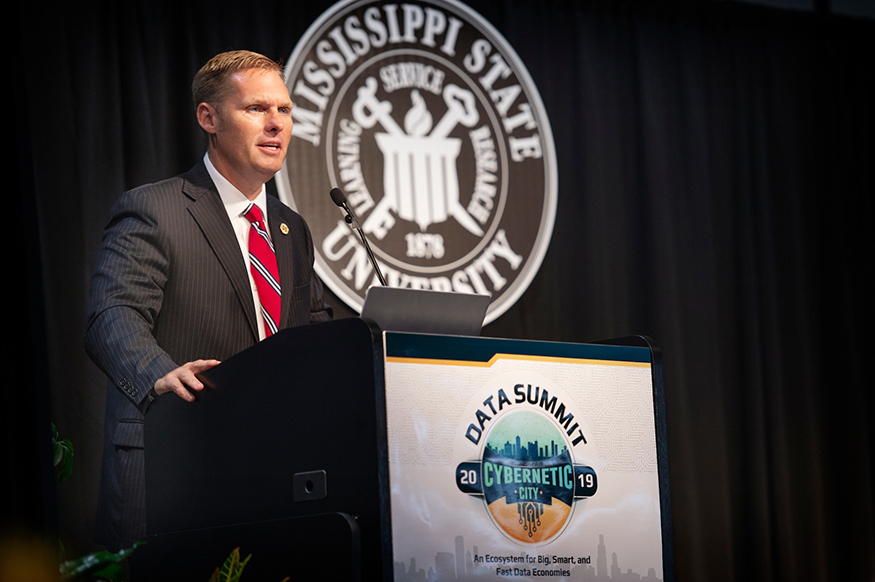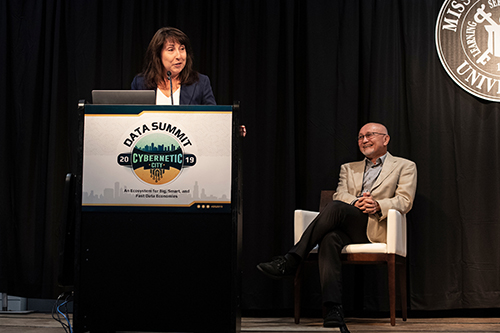State leaders gather at MSU for fourth annual NSPARC Data Summit

Contact: James Carskadon
STARKVILLE, Miss.—Government and industry leaders from across Mississippi discussed the many ways data can advance the Magnolia State at the fourth annual Data Summit, hosted by Mississippi State’s National Strategic Planning and Analysis Research Center (NSPARC).
The two-day summit, held at The Mill at MSU, featured presentations, panel discussions, breakout sessions, networking opportunities and keynote luncheon—all focused on the undeniable value of data in increasingly connected cities and towns.
U.S. Congressman Michael Guest, an MSU alum, discussed the ways data analysis helps the federal government serve citizens in areas such as weather forecasting, homeland security and transportation, among others. He also stressed the importance of expanding rural broadband to help all citizens become connected to the technologies that have become a necessity in modern life.
“I am confident that Mississippi and Mississippi State University will continue to play a leading role in the way that we use data and technology, and we will use that to improve our lives and empower our citizens,” Guest said.
Sessions at the data summit focused on how data and technology impact areas such as workforce development, athletic performance, criminology, community resilience, artificial intelligence, energy and more.
MSU President Mark E. Keenum said institutions of higher learning must be on the cutting edge of technology in order to prepare students for a rapidly-changing world. He said he was proud of the way MSU’s super computer, Orion, supports informed decision-making and research for several state, federal and industry partners. Capable of processing 5 quadrillion calculations per second, Orion is the 4th fastest computer system in U.S. academia and is the most powerful system housed at a Southeastern Conference university.
“I tell high school students that all the marvels that students in the class of 1920 saw in their lifetime and the 20th century will pale in comparison with what the students in the class of 2020 are about to witness in this unbelievable 21st century,” Keenum said. “I focus on bringing world-class scientists, researchers and teachers to this institution so that we can better equip our young people to have a great education and a foundation, not only in the knowledge we share with them, but reinforcing values that are timeless—such as having integrity, a strong work ethic and being respectful of everybody.”

The keynote speech was delivered by Cybercrime Support Network Founder Kristin Judge and Center for Internet Security Senior Vice President Tony Sager, who discussed several current initiatives to assist victims of cybercrime.
“With the internet, we have created the greatest information machine imaginable,” Sager said. “Your access to information and your power is unprecedented. Yet, we’ve also created the greatest engine for theft, surveillance and counter-intelligence imaginable. It’s an outstanding array of opportunities and problems, and there’s no going back.”
Judge began efforts to support cybercrime victims after realizing how few resources are available for them. Her organization works with local, state and federal partners to improve reporting of these crimes and provide assistance.
“We are speaking for the victims, giving them a voice and helping them get into the system for help,” Judge said.
Founded in 1998, NSPARC is a university research center with more than 100 diverse employees, ranging from data scientists to software architects and security experts. NSPARC supports MSU’s overarching goals of research, learning, and service by collaborating within the university, through local, state, and federal agencies, and across the private sector to help society grow by discovering solutions to societal problems by using data science. For more, visit www.nsparc.msstate.edu.
MSU is Mississippi’s leading university, available online at www.msstate.edu.